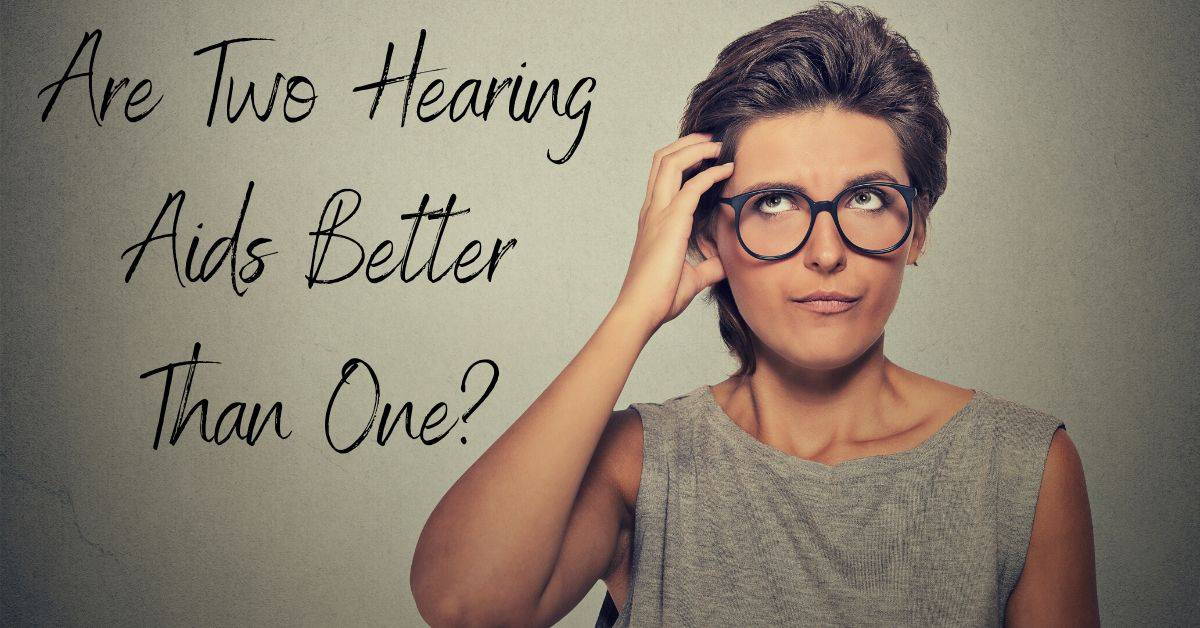
- Common Misconceptions That Delay Hearing Loss Diagnosis - June 6, 2025
- Signs Your Earwax Buildup Needs Professional Attention - May 29, 2025
- Preparing for a Hearing Test and What You Should Bring - May 16, 2025
You may have heard the saying “Two heads are better than one.” Well, so are two hearing aids. Bilateral hearing loss is the loss of hearing in both ears. In this case, two hearing aids are recommended. Hearing loss affects thousands of people around the world. For each person, it happened differently. It either came on gradually or was a sudden change that occurred overnight. Some may have listened to their headphones at too high of a volume or some may have been exposed to high decibels of sound at work that they couldn’t avoid. Mo matter how the hearing loss occurred, it is now something the person will have to deal with for the rest of their lives.
While some choose to use two hearing aids, some are choosing to only use one. Some are not using any hearing aids at all. This may be due to them being in denial and not wanting to accept that their hearing is damaged, probably forever. It is a tough thing to accept. However, the sooner it is accepted, the sooner treatment can be administered and a hearing aid can be assigned. Two hearing aids are recommended whether you are diagnosed with unilateral hearing loss (loss of hearing in one ear) or bilateral hearing loss.
The benefits of using two hearing aids versus one is substantial. With two hearing aids, you will hear so much better. You will notice the quality of your conversations increase as you do not have to ask people to repeat themselves. You will be able to watch television without having to increase the volume constantly. Your quality of life will increase substantially. If you have bilateral hearing loss, that is you can’t hear out of either of your ears, it goes without saying that two hearing aids will benefit you by allowing you to hear almost as well as you did before.
Even with bilateral hearing loss, some people prefer to not have two hearing aids in all the time. They would rather just deal with one. It us also thought that in people with dementia, two hearing aids are overstimulating. It is too much noise for them to handle and more than they’re used to. However, for younger people affected by hearing loss, new research has shown that wearing bilateral hearing aids, whether unilateral or bilateral, help the brain to remain functional later in life.
New studies are proving that hearing loss is linked directly to cognitive decline of the brain. Researchers are seeing that when hearing loss occurs, something detrimental happens. It actually begins to reorganize itself. It’s like it senses that the part of the brain that was supposed to focus on hearing isn’t needed anymore. In that case, it switches everything up and reorganizes itself to make up for what it is not doing anymore. Whether that is putting emphasis on vision or touch or taste, it begins subtracting itself from being active in other parts of the brain leading to cognitive decline and an overall decrease in function itself.
If you suspect you have unilateral or bilateral hearing loss, you are greatly encouraged to purchase a hearing aid or talk to your doctor about your options if you have not done so already. He may suggest hearing aids or surgery depending on the severity of the damage. It is crucial you get a diagnosis though as soon as possible. The sooner you get a diagnosis, the sooner you can be treated. Once treated, you can resume your normal life and activities. You will be surprised at the difference it will make being able to have a clear conversation with your loved ones without straining to hear what it is they are saying.
Once the damage to the ear is done, it is for the majority of the time, irreversible. A hearing aid is one of the closest things you can acquire that will give you and your loved ones a sense of normalcy. If at all possible, it would benefit you to use two hearing aids, even if you are only suffering from unilateral hearing loss. If you are suffering from bilateral hearing loss, two hearing aids will improve brain function from all sides. Your brain can continue to operate as normal using the necessary wires and connections to help you hear. The most important thing you can do for yourself is talk to a doctor even if there is just a suspicion that hearing loss is occurring. At the end of the day, you will be thankful that you did.
